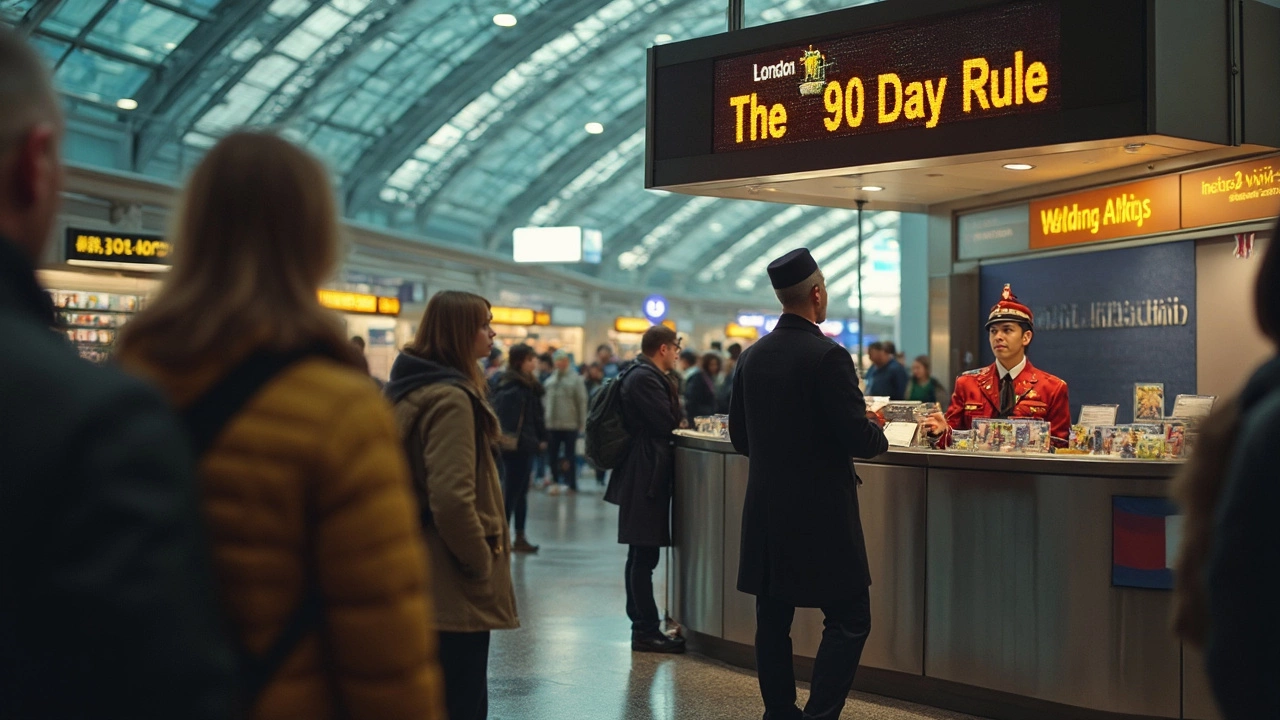90-Day Rule in London: What It Means for Your UK Staycation
 May, 20 2025
May, 20 2025
The 90-day rule trips up more people than you'd think. If you’re not a UK citizen, there’s a good chance you can’t just hang out in London indefinitely—even if all you want is the perfect selfie with Big Ben or to try every bakery in Soho. Instead, UK border rules say visitors from most countries can only stay up to 90 days in any 180-day period without a visa.
So, what does that actually mean? It’s not just 90 days in a row and you’re set for life. Every time you enter the UK, border officers are checking how many days you’ve already spent there in the past six months. Go over, and you risk being refused entry the next time you land at Heathrow—or even getting banned from returning for years. It sounds harsh, but it’s very real.
If you’re planning an extended London staycation, this rule matters. Ignoring it is way riskier than just getting a fine; folks have been stuck trying to explain themselves with all their luggage at Paddington, only to be swiftly sent back on the next flight home. Keeping a calendar or using a travel app isn’t just smart—it’s essential.
- What Exactly Is the 90-Day Rule?
- Who Needs to Worry About It?
- How to Track Your Stay in London
- Clever Tips for a Stress-Free Staycation
What Exactly Is the 90-Day Rule?
The 90-day rule is all about how long you can spend in the UK as a visitor without breaking the law. If you're from a country that doesn't need a visa to enter the UK as a tourist—think USA, Canada, Australia, most of Europe—you get up to 90 days of stay in any rolling 180-day window. This means it's not a flat 90 days per year, and it doesn't reset every January or on your birthday.
People trip up on the rolling part. Let's say you arrive in London on June 1st and stay for 60 days. You pop back home, then try to return in September for another 60 days. When border officers look back over the last 180 days, they'll see you want to spend 120 days in total, which is 30 days over the allowed limit. That's when the trouble starts.
Here's what counts under the rule:
- Every day you spend in the UK, including your arrival and departure days.
- The past 180 days is a moving window—so every time you enter, border control checks your last 180 days of UK visits.
- Time spent in Ireland doesn’t count towards your UK tally, but Northern Ireland does, since it's part of the UK.
The 90-day rule is strict. Overstaying—even if you think “just a few days won't matter”—can mean being barred from entering the UK on future trips. Border officers check stamps, electronic records, and can even ask you to show proof of departure from earlier visits.
If you need more than 90 days, you have to apply for a different kind of visa before you travel. Don't chance it at the border—hearing “sorry, you can't come in” after a long flight is not the start to your London adventure you want.
Who Needs to Worry About It?
This rule isn’t just a background detail. If you’re not a British or Irish citizen, chances are you should pay close attention, especially if you’re eyeing a long trip or repeated London staycations. Most visitors from the US, Australia, Canada, and the EU fall under this 90-day limit. The UK says you can visit as a tourist without a visa, but only within those 90 out of any 180 days. If you’re planning to visit, leave, and bounce back again? Border officers will absolutely add up ALL your London time within that window.
Working remotely from a trendy Notting Hill flat or bingeing West End shows? Forget about stretching those three months to four and hoping no one will notice. The rules are clear: it’s not about how many trips you take, but the total days spent in the UK across half a year. And yes, time spent anywhere in the UK—not just London—counts.
- Travelers from countries needing a Standard Visitor visa: This includes people from India, China, Nigeria, and several other nations. Even with the visa, the cap’s the same—90 days per visit, unless your visa says otherwise.
- EU, US, Canada, Australia, New Zealand passport holders: No pre-arranged visa needed, but the 90-day rule is strict. Don’t assume you can just return again right away if you’ve used up your 90 days.
- Dual citizens: If you hold both a UK and another passport, use your UK one to avoid this rule altogether.
- People with special permissions: Got a student visa, work visa, or spousal visa? You’re under different rules and don’t need to stress about this limit as long as your visa is valid.
The messiest part: families and couples. If you visit your partner or relatives often, be ready to back up your reasons for travel, show proof of ties back home, and demonstrate you’re not trying to secretly live in London without the right paperwork. Immigration officers have seen every story.

How to Track Your Stay in London
If you’re making the most of your UK staycation, you’ll want to know exactly how many days you’ve spent in London. Trusting your memory? Not a great plan. The UK counts every single day you set foot in the country, even if you fly in at 11:50 PM. The most important thing is making sure you don’t accidentally blow past that 90-day rule.
Here’s how you can keep your stays straight without giving yourself a headache:
- Use your passport stamps: Every time you arrive in the UK, border control stamps your passport with the date. Flip through and count the days if you lose track.
- Apps to the rescue: There are free apps like Schengen Calculator or myTSA (yes, it’s American but it works) that let you plug in your arrival and departure dates so you don’t have to do the math.
- Set reminders: Mark entry and exit dates in your phone’s calendar. Set an alert a week before your 90 days are up. Give yourself buffer time for delays or changes.
- Keep a travel log: Jot down a quick note in your notes app every time you land or leave. Simple, but super helpful if anyone asks for proof.
Don’t guess. The UK Border Force isn’t known for being forgiving. Instead, keep things crystal clear for yourself—and anyone who might check.
| Entry | Exit | Days Spent |
|---|---|---|
| Jan 10, 2025 | Feb 9, 2025 | 31 |
| Apr 5, 2025 | May 19, 2025 | 45 |
| June 1, 2025 | June 14, 2025 | 14 |
| Total in 180 Days | 90 | |
If you’re ever unsure, double-check your trips using a calculator or even a simple spreadsheet. It’s worth it. You don’t want any nasty surprises halfway through your dream London break.
Clever Tips for a Stress-Free Staycation
If you want your London adventure to go smoothly, there are a bunch of tricks that can help you stay on track with the 90-day rule. No one wants to have their trip cut short or face awkward questions at passport control.
- 90-day rule: Always double-check the date you arrived in the UK and keep your entry stamps handy. This helps you count out your days so you’re never caught off guard.
- Set reminders: Use your phone’s calendar to mark your entry and projected exit dates. Apps like Schengen Calculator (yes, it works for the UK too) are pretty handy for tracking your days.
- Book open travel: If you’re close to your 90 days, grab a ticket out of the UK before your limit is up. Border officers appreciate it when they see proof you’re planning to leave on time, and it clears up any doubts right away.
- Mix it up: The 90 days aren’t just for London. Want to extend your adventure? Hop over to Ireland, France, or Spain for a bit, then come back (keeping in mind your rolling 180-day window!).
- Paper trail: Hold on to train tickets, hotel bookings, and receipts. If push comes to shove, showing you’re a genuine tourist is way easier with proof in hand.
Worried about overstaying? Here’s what happens if you do, and how to avoid it:
| Consequence | How to avoid |
|---|---|
| Possible entry ban (up to 10 years) | Track every day in the UK, set alerts one week before your final day |
| Deportation and future visa issues | Book a return ticket ahead of time, save all travel docs |
| Refusal of entry on future visits | Don't leave stays until the last minute—leave with days to spare |
If your dream is to stay longer—maybe work, study, or stay with family—make sure you look into the right visa instead. The rules for tourists and visitors are strict, but planning ahead means you won’t have any nasty surprises. A little prep now, and your UK staycation stays fun, not stressful.
